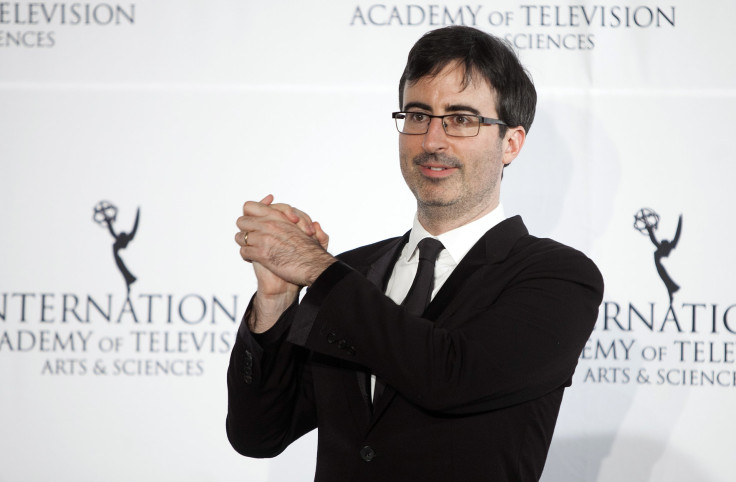What Is Net Neutrality? Meaning Is Fuzzy Even As Comedian John Oliver, Netflix Help Pro-Neutrality Petition Get 647K Signatures

"Rare" doesn't begin to describe how uncommon it is for online content providers, civil liberties watchdogs and Internet commenters to almost universally agree on a single issue. Yet for all the bluster, the ongoing debate over something called "net neutrality" has left many Americans in the dark about how serious the ramifications are.
Activists have warned for years that the Internet as we know it (the open Internet) will cease to exist if corporations or naive Washington policymakers try to change the current arrangement, which has created the greatest source of free-flowing information perhaps ever known. The current guidelines force Internet service providers (ISPs) like AT&T Inc. (NYSE:T), Comcast Corp. (NASDAQ:CMCSA) and Verizon Communications Inc. (NASDAQ:VZ) to treat all Internet traffic -- whether it be streaming video, large downloads or just casual emails -- the same, forbidding them from charging more for conveying digital content that puts a strain on network connections.
The effect of the current guidelines is to promote the free and open flow of information of data.
Tim Wu, a Columbia Law School professor, explained on his website that network "neutrality is best defined as a network design principle. The idea is that a maximally useful public information network aspires to treat all content, sites and platforms equally."
The major ISPs, though, including Verizon Communications and Comcast have long sought to challenge the current guidlines, arguing that they should be free to enter into exclusive agreements with major Internet companies that produce content. The ISPs have asserted that such exclusive deals would create "fast lanes" for those content creators, including Google Inc. (NASDAQ:GOOG) and Netflix Inc. (NASDAQ:NFLX).
However, those content companies have criticized the idea of fast lanes as nothing more than a cash grab, with any content provider that doesn't agree to accept a fast-lane contract with an ISP likely to suffer slow Internet speeds and various transmission problems. The upshot, critics of fast lanes argue, would be a loss of the information free-flow.
The clash between defenders of the status quo, who argue for net neutrality, and ISPs, who want fast lanes, has been playing out in several venues. In January of this year, a federal court sided with Verizon and ruled that ISPs are free to charge streaming services more to broadcast their services via online fast lanes. Not surprisingly, Amazon.com Inc. (NASDAQ:AMZN), Netflix Inc. and other companies are infuriated at the idea of paying more and have said that much of that cost could be passed on to the consumer.
But even more pressing than the federal court case is the fact that the Federal Communications Commission wraps up the first round of public input on Tuesday. FCC Chairman Tom Wheeler, himself a former lobbyist for the telecommunications industry, announced on Twitter Friday that 647,000 comments have come in so far. Net neutrality advocates are nervous that too few regular citizens will contact the FCC, thus giving the agency implicit permission to go through with a plan that content creators have said gives ISPs a monopoly on the Internet.
For instance, a Comcast deal with Apple Inc. (NASDAQ:APPL) could make iTunes the sole provider of movies and shows for AT&T customers, leaving Amazon Prime and Netflix customers in the dark.
Comedian John Oliver hilariously explained the situation on his HBO show “Last Week Tonight” not long after its debut in late April:
While the issue has yet to be decided, content creators and ISPs have sought to embarrass each other in an attempt to sway public opinion to their side of the debate. In May, when frustrated Netflix customers found that their videos weren’t streaming properly, they were presented with a buffer screen reading “The Verizon network is crowded right now, Adjusting video playback.” Google, by the same token, has made headlines for creating a Video Quality page pointing YouTube users with a bad connection to a page where they can compare their Internet service with others in the area.
The American Civil Liberties Union (ACLU) has strongly opposed creating so-called fast lanes, which could happen by the end of 2014, according to some forecasters. Rather than just warning about corporate abuses, though, the ACLU published a list of recent incidents in which telecommunication companies had vast control over mass communication events; that publication supported the argument that those companies abuse the privilege. Perhaps the most egregious examples were Verizon stopping a text-message program for NARAL Pro-Choice America and AT&T Inc. (NYSE:T) censoring a profanity free performance by Pearl Jam in which they protested then-President George Bush.
Sen. Chuck Schumer, D-N.Y., called on the FCC Friday to adopt a European idea reclassifying ISPs as public utilities, which would prevent the FCC from rescinding the current rules.
“The Internet in the 21st century is as important to our future as highways were in the 20th century. Like a highway, the Internet must remain free and open for all; not determined by the highest bidders,” he said in a statement, adding that “reclassification is the best way for us to preserve the Internet as an unfettered tool for communication and the sharing of ideas.”
© Copyright IBTimes 2024. All rights reserved.





















